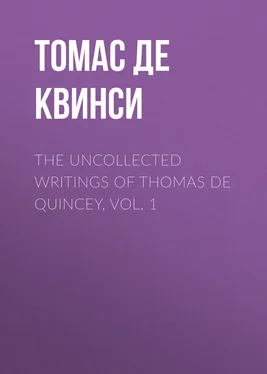Томас Де Квинси - The Uncollected Writings of Thomas de Quincey, Vol. 1
Здесь есть возможность читать онлайн «Томас Де Квинси - The Uncollected Writings of Thomas de Quincey, Vol. 1» — ознакомительный отрывок электронной книги совершенно бесплатно, а после прочтения отрывка купить полную версию. В некоторых случаях можно слушать аудио, скачать через торрент в формате fb2 и присутствует краткое содержание. Жанр: foreign_prose, literature_19, foreign_antique, на английском языке. Описание произведения, (предисловие) а так же отзывы посетителей доступны на портале библиотеки ЛибКат.
- Название:The Uncollected Writings of Thomas de Quincey, Vol. 1
- Автор:
- Жанр:
- Год:неизвестен
- ISBN:нет данных
- Рейтинг книги:4 / 5. Голосов: 1
-
Избранное:Добавить в избранное
- Отзывы:
-
Ваша оценка:
- 80
- 1
- 2
- 3
- 4
- 5
The Uncollected Writings of Thomas de Quincey, Vol. 1: краткое содержание, описание и аннотация
Предлагаем к чтению аннотацию, описание, краткое содержание или предисловие (зависит от того, что написал сам автор книги «The Uncollected Writings of Thomas de Quincey, Vol. 1»). Если вы не нашли необходимую информацию о книге — напишите в комментариях, мы постараемся отыскать её.
The Uncollected Writings of Thomas de Quincey, Vol. 1 — читать онлайн ознакомительный отрывок
Ниже представлен текст книги, разбитый по страницам. Система сохранения места последней прочитанной страницы, позволяет с удобством читать онлайн бесплатно книгу «The Uncollected Writings of Thomas de Quincey, Vol. 1», без необходимости каждый раз заново искать на чём Вы остановились. Поставьте закладку, и сможете в любой момент перейти на страницу, на которой закончили чтение.
Интервал:
Закладка:
When Dryden wrote his famous, indeed matchless, epigram upon the three great masters (or reputed masters) of the Epopee, he found himself at no loss to characterize the last of the triad—no matter what qualities he imputed to the first and the second, he knew himself safe in imputing them all to the third. The mighty modern had everything that his predecessors were ever thought to have, as well as something beside. 5 5 The beauty of this famous epigram lies in the form of the conception. The first had A; the second had B; and when nature, to furnish out a third, should have given him C, she found that A and B had already exhausted her cycle; and that she could distinguish her third great favourite only by giving him both A and B in combination. But the filling up of this outline is imperfect: for the A ( loftiness ) and the B ( majesty ) are one and the same quality, under different names.
So he expressed the surpassing grandeur of Milton, by saying that in him nature had embodied, by concentration as in one focus, whatever excellencies she had scattered separately amongst her earlier favourites. But, in strict regard to the facts, this is far from being a faithful statement of the relations between Milton and his elder brothers of the Epos : in sublimity, if that is what Dryden meant by 'loftiness of thought,' it is not so fair to class Milton with the greatest of poets, as to class him apart, retired from all others, sequestered, 'sole-sitting by the shores of old romance.' In other poets, in Dante for example, there may be rays, gleams, sudden coruscations, casual scintillations, of the sublime; but for any continuous and sustained blaze of the sublime, it is in vain to look for it, except in Milton, making allowances (as before) for the inspired sublimities of Isaiah, Ezekiel, and of the great Evangelist's Revelations. As to Homer, no critic who writes from personal and direct knowledge on the one hand, or who understands the value of words on the other, ever contended in any critical sense for sublimity, as a quality to which he had the slightest pretensions. What! not Longinus? If he did, it would have been of little consequence; for he had no field of comparison, as we, knowing no literature but one—whereas we have a range of seven or eight. But he did not: Τὸ ὑψηλον, 6 6 Because the Latin word sublimis is applied to objects soaring upwards, or floating aloft, or at an aerial altitude, and because the word does sometimes correspond to our idea of the sublime (in which the notion of height is united with the notion of moral grandeur), and because, in the excessive vagueness and lawless latitudinarianism of our common Greek Lexicons, the word ὑψος is translated, inter alia , by το sublime , sublimitas , &c. Hence it has happened that the title of the little essay ascribed to Longinus, Περι ὑψους, is usually rendered into English, Concerning the sublime . But the idea of the Sublime, as defined, circumscribed, and circumstantiated, in English literature—an idea altogether of English growth—the sublime byway of polar antithesis to the Beautiful , had no existence amongst ancient critics; consequently it could have no expression. It is a great thought, a true thought, a demonstrable thought, that the Sublime, as thus ascertained, and in contraposition to the Beautiful, grew up on the basis of sexual distinctions, the Sublime corresponding to the male, the Beautiful, its anti-pole, corresponding to the female. Behold! we show you a mystery.
or the elevated, in the Longinian sense, expressed all, no matter of what origin, of what tendency, which gives a character of life and animation to composition—whatever raises it above the dead level of flat prosaic style. Emphasis, or what in an artist's sense gives relief to a passage, causing it to stand forward, and in advance of what surrounds it—that is the predominating idea in the 'sublime' of Longinus. And this explains what otherwise has perplexed his modern interpreters—viz. that amongst the elements of his sublime, he ranks even the pathetic, i. e. (say they) what by connecting itself with the depressing passion of grief is the very counter-agent to the elevating affection of the sublime. True, most sapient sirs, my very worthy and approved good masters: but that very consideration should have taught you to look back, and reconsider your translation of the capital word ὑψος. It was rather too late in the day, when you had waded half-seas over in your translation, to find out either that you yourselves were ignoramuses, or that your principal was an ass. 'Returning were as tedious as go o'er.' And any man might guess how you would settle such a dilemma. It is, according to you, a little oversight of your principal: ' humanum aliquid passus est. ' We, on the other hand, affirm that, if an error at all on the part of Longinus, it is too monstrous for any man to have 'overlooked.' As long as he could see a pike-staff, he must have seen that. And, therefore, we revert to our view of the case—viz. that it is yourselves who have committed the blunder, in translating by the Latin word sublimis 7 7 No word has ever given so much trouble to modern critics as this very word (now under discussion) of the sublime . To those who have little Greek and no Latin, it is necessary in the first place that we should state what are the most obvious elements of the word. According to the noble army of etymologists, they are these two Latin words— sub , under, and limus , mud. Oh! gemini! who would have thought of groping for the sublime in such a situation as that?—unless, indeed, it were that writer cited by Mr. Coleridge, and just now referred to by ourselves, who complains of frivolous modern readers, as not being able to raise and sequester their thoughts to the abstract consideration of dung. Hence it has followed, that most people have quarrelled with the etymology. "Whereupon the late Dr. Parr, of pedantic memory, wrote a huge letter to Mr. Dugald Stewart, but the marrow of which lies in a nutshell, especially being rather hollow within. The learned doctor, in the first folio, grapples with the word sub , which, says he, comes from the Greek—so much is clear—but from what Greek, Bezonian? The thoughtless world, says he, trace it to ὑπο (hypo), sub, i. e. under; but I, Ego, Samuel Parr, the Birmingham doctor, trace it to ὑπερ (hyper), super, i. e. above; between which the difference is not less than between a chestnut horse and a horse-chestnut. To this learned Parrian dissertation on mud, there cannot be much reasonably to object, except its length in the first place; and, secondly, that we ourselves exceedingly doubt the common interpretation of limus . Most unquestionably, if the sublime is to be brought into any relation at all to mud, we shall all be of one mind—that it must be found above . But to us it appears—that when the true modern idea of mud was in view, limus was not the word used. Cicero, for instance, when he wishes to call Piso 'filth, mud,' &c. calls him Cænum : and, in general, limus seems to have involved the notion of something adhesive, and rather to express plaister , or artificially prepared cement, &c., than that of filth or impure depositions. Accordingly, our own definition differs from the Parrian, or Birmingham definition; and may, nevertheless, be a Birmingham definition also. Not having room to defend it, for the present we forbear to state it.
at all, but still more after it had received new determinations under modern usage.
Now, therefore, after this explanation, recurring to the Longinian critiques upon Homer, it will avail any idolator of Homer but little, it will affect us not much, to mention that Longinus makes frequent reference to the Iliad , as the great source of the sublime—
Читать дальшеИнтервал:
Закладка:
Похожие книги на «The Uncollected Writings of Thomas de Quincey, Vol. 1»
Представляем Вашему вниманию похожие книги на «The Uncollected Writings of Thomas de Quincey, Vol. 1» списком для выбора. Мы отобрали схожую по названию и смыслу литературу в надежде предоставить читателям больше вариантов отыскать новые, интересные, ещё непрочитанные произведения.
Обсуждение, отзывы о книге «The Uncollected Writings of Thomas de Quincey, Vol. 1» и просто собственные мнения читателей. Оставьте ваши комментарии, напишите, что Вы думаете о произведении, его смысле или главных героях. Укажите что конкретно понравилось, а что нет, и почему Вы так считаете.












